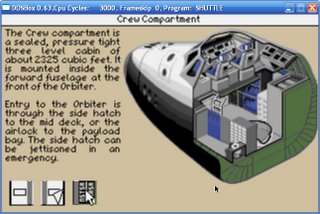Search This Blog
Saturday, December 23, 2006
Happy Holidays!
-BNGPossum
Sunday, December 10, 2006
Discovery launches!
There's nothing more awe-inspiring than the nighttime launch of a Space Shuttle.
Tuesday, November 21, 2006
Finally: A Civ IV Tech Tree Editor!
Tuesday, November 07, 2006
I was excited about Star Trek Legacy, until...
Monday, October 30, 2006
Orbiter 2006: It's not just for fun...
Monday, October 09, 2006
Star Trek Turns 40
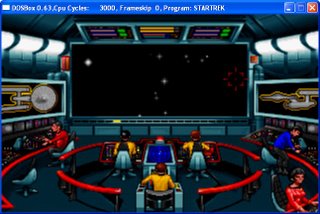 A few weeks ago, Star Trek celebrated its 40th Anniversary with a whimper, not a bang, although the surprise release of the long-overdue Star Trek Remastered was welcome news. Good thing that Star Trek Legacy is coming out soon, and it's actually looking quite promising if the recent CGW feature article is any indication. The designers continue to say all the right things, the screencaps look great, and grouping all five Star Trek incarnations with a D.C. Fontana-penned (writer of the famed TOS episode "Journey to Babel," as well as the Bridge Commander storyline) story could turn out pretty well. I've officially upgraded my status from "guardedly optimistic" to "cautiously hopeful." Although I'm on record as thinking that a new Star Trek single player RPG or adventure game should be made ASAP, when you throw in the possibility of getting to command your own crew in Star Trek Online, things just might be looking up in the world of Star Trek computer games. Although I'm worried that Legacy might not run on my little Inspiron, I'm a lot more excited about Legacy than I am about Star Trek XI. In fact, I think that the best Star Trek for the forseeable future is in all likelihood going to exist in computer game form. Why, you ask?
A few weeks ago, Star Trek celebrated its 40th Anniversary with a whimper, not a bang, although the surprise release of the long-overdue Star Trek Remastered was welcome news. Good thing that Star Trek Legacy is coming out soon, and it's actually looking quite promising if the recent CGW feature article is any indication. The designers continue to say all the right things, the screencaps look great, and grouping all five Star Trek incarnations with a D.C. Fontana-penned (writer of the famed TOS episode "Journey to Babel," as well as the Bridge Commander storyline) story could turn out pretty well. I've officially upgraded my status from "guardedly optimistic" to "cautiously hopeful." Although I'm on record as thinking that a new Star Trek single player RPG or adventure game should be made ASAP, when you throw in the possibility of getting to command your own crew in Star Trek Online, things just might be looking up in the world of Star Trek computer games. Although I'm worried that Legacy might not run on my little Inspiron, I'm a lot more excited about Legacy than I am about Star Trek XI. In fact, I think that the best Star Trek for the forseeable future is in all likelihood going to exist in computer game form. Why, you ask?Since Enterprise was canceled and Nemesis failed at the box office, there's been all kinds of stories about what Star Trek needs in order to come back. This ignores a simple point: People won't spend time or pay money to watch awful stuff, even if it says Star Trek in the title. A prequel show actually could have been great, but Enterprise-as-aired was just a terrible show: The writing was horrible, none of the characters were memorable, the acting was wooden, and the series didn't just flaunt the established continuity, it barfed all over it. It wasn't until the fourth season that the show started to tell the kinds of respectful and interesting stories that the fans had been expecting, but by then nobody cared. I personally gave up on the show halfway through the second season. Now that I've seen some of the fourth season shows in syndication, I think that the show would still be on the air if it had started telling those stories right off the bat. Quality fourth season episodes nothwithstanding, Enterprise was sufficiently horrible that a "retcon" is in order, and I hope that future Trek producers will decide to ignore that it was ever produced (just like what happened to the Star Trek Animated Series).
The immediate cause of Nemesis failing was that it came out the week before The Two Towers. But the real reason was that like most films in the Internet era, the shooting script had leaked several months beforehand and it was pretty obvious that this movie was just a lame TNG version of The Wrath of Khan, so many fans choose to save their money and stay home. One of the problems that I had with it (besides the gaping plot holes and logic errors) was that the death of Data was was quite contrived and unnecessary from a dramatic standpoint. Mainly, though, my biggest problem with Nemesis was that it was the fourth TNG movie but still had the same friggin' plot as the first three: overblown villian vs. Our Heroes. Bah. This is Star Trek, not James Bond. The critics reached similar conclusions and really pounded Nemesis, which, combined with the LOTR thing, is probably why most casual Star Trek fans stayed home. I'm a big TNG fan so I went to see it anyway, despite my misgivings, largely because I'd seen every ST movie in a theater and didn't want to break the streak.
I read most of the reviews of the movie, and it was pretty obvious that (repetitive plotline aside) the critics had also gotten just as tired of the whole Star Trek concept; I remember one reviewer called Star Trek's characteristic optimism "grating" and others called the notion of space travel "silly". This is an important point that is utterly lost on many Star Trek fans : A society that doesn't find the idea of people exploring space to be inherently awesome will not find a show about people exploring space remotely interesting. Surprisingly, many modern Star Trek fans have forgotten this and couldn't care less about the real-world exploration of space; they care more about the character interaction and philosophy and so forth [Don't believe me? Head over to a Star Trek forum and you'll see a disturbingly high number of "the space program is a waste of money" posts. The irony is lost on them....]. It was the Apollo landings and the development of the Shuttle (and all of the hopes that went with it) that fueled the 1970s popularity of Star Trek (and, for that matter, Star Wars and Close Encounters). I think that it is telling that at the height of it's popularity (circa 1986 to 1992-ish) the Shuttles were flying regularly, we were on our way to the Moon and Mars, and Space Station Freedom was going to be finished by 1997. There was a lot more general excitement about our future in space. I think it's safe to conclude that if Star Trek is ever going to be as popular as it was even fifteen years ago, then society is going to have to be reprimed to acknowledge that human space development really is exciting and important. To that end, the best possible thing for Star Trek fans to do to "save" the show is to simply start doing their part by a) actually paying attention to what NASA and ESA and Energia and NewSpace companies are doing here in real life and b) writing letters supporting space exploration to Congress and newspapers, instead of starting useless "save-our-show" letter writing campaigns. Besides this obvious and important point, what other lessons can we learn from recent Star Trek?
- It's about exploration, stupid. It's right up there in the opening credits, the most famous split infinitive in history and the phrase which really ought to be the NASA motto: "To boldly go where no man has gone before." Even TNG did very little boldly going. If you're on a starship exploring, then you should actually go find exciting stuff at frequent intervals. The last two movies have featured diplomatic negotiation as key plot points. Y-a-w-n. It can be done, and done well: Exhibit A is Stargate SG-1 and Stargate Atlantis, any episode of which features more adventure and fun than any Star Trek produced in the 21st century. If you aren't floored by the innate coolness of what you're seeing you're not going to want to come back.
- Continuity is not a problem. People stopped watching Enterprise in large part because it flat-out barfed on the established continuity. We're not talking about little dippy Nitpicker errors, either. I couldn't care less if in one episode the Enterprise can only go at warp 4.9 and in the next one, it's charging at warp 5.5. Bah. That's small-time. We're talking about big, gaping, monstrous problems: Emotional lying kung-fu Vulcans, a "primitive" starship that looks just like a TNG starship, first contact with the Klingons not causing a war, a heretofore unmentioned Xindi attack, and TNG stuff like holodecks, Borg, and photon torpedoes popping up in Season One. Would it really have been that hard to take a few minutes and look this stuff up in the Star Trek Encyclopedia? I didn't think so. Would the stories on Enterprise have suffered any from doing so? Well, they couldn't have gotten any worse, that's for sure.
- Villians are overrated. Yes, The Wrath of Khan is everyone's favorite ST movie (except mine! I'm partial to The Motion Picture), and it happens to involve a larger-than-life villian with a powerful device that could be used as a weapon. Unfortunately, it has established a pattern that has proven almost impossible to escape. This plot device of a scenery-chewing villian who gets a Big Gun and threatens universal peace has now been the key story point of 8 of the 10 Star Trek movies, and it's completely worn out it's welcome. I think that it's quite telling that the absolute, hands down most popular ST movie is The Voyage Home, which made a tremendous amount of money and was a resounding popular and critical success (launching TNG in the process)--all without a scenery chewing villian.
- It's gotta be fun. Star Trek at its best has a certain joie de vivre: it should be an optimistic, hopeful, and interesting adventure. Seeing the Enterprise in the first movie? Fun. The battle in the Mutara Nebula? Fun. The Voyage Home? Fun. Worf bounding through infinite parallel universes? Fun. Sisko and company visiting the original ship? Fun. Voyager almost getting home? Not fun. Overblown villian threating Earth with a particle-of-the week gun killing Data for no reason? Not fun. Watching Captain Archer meander his way through a tepid, poorly written, ill-conceived episode? Not, by any definition, fun.
- You have to see the Enterprise. The Enterprise got really short shrift in the last four movies. All we got to see of the cool new ship was the bridge and a few lame rooms (the ship's library? who wants to see that, and why would you need one aboard a starship, anyway--don't they have Google Book Search in the future?). It wasn't any different or cooler than the things you ever saw on the series.
- It's gotta be cool. The interior design of the ship in the Enterprise show was lousy, too: cramped, dank, and decidedly non-futuristic. I wouldn't want to be on that ship unless I had a big flashlight. Here in real life, the International Space Station has been designed to be open and airy to improve morale and prevent cluaustrophobia. The new ship has to be clean, bright and futuristic-looking if you want your audience to believe that you're in the future. This is one of the big problems with Battlestar Galactica: Everything on that show, even the big ship that can go faster-than-light, looks exactly like present-day stuff, which, frankly, is pretty distracting.
- Quit reversing the polarity already. From about the 6th season of TNG on, the answer to nearly every problem has been reversing the polarity on some kind of subatomic particle. They never did that on the old series and things worked out fine. They tried really hard not to do this on Enterprise, but they just couldn't help themselves. Plus, it really wouldn't hurt to talk to a real scientist or engineer occasionally. Enterprise had some aneyurism-inducing scientific blunders.
- Grit hurts your teeth. Ever since the success of Battlestar Galactica, I've heard a lot about how ST needs to be "gritty". They tried to make Enterprise gritty, and it was just annoying. Sweaty folks yelling at each other is not the only ingredient behind successful entertainment.
- No Time for Time Travel. Ahh, the most overused plot device in Star Trek. Unfortunately, this one has some pedigree, because the old guys did it on the Original Series and again in The Voyage Home, with great success. Unfortunately, since that point time travel has been a major part of two more ST movies and countless episodes, and a ludicrous "Temporal Cold War" that culminated in goofy space Nazis was a big part of Enterprise. A completely mediocre Voyager episode-which I never saw, because I quit watching Voyager early on due to excessive lameness--even suggested that Starfleet would be flying "timeships" through the timeline by the 29th century. Enough already. Again, I point to the opening credits: "Space, the final frontier...." If we wanted to watch a show about time travel we'd watch Dr. Who.
In general, my overarching conclusion is that the "problem" with Star Trek stems more from a general lack of creativity and attention to detail, coupled with a society that does not currently value the adventure and breathtaking promise of space, and not from any inherent flaw with the concept or the established continuity.
So, having already said too much, what do I think about the eleventh movie? I think that a Battlestar Galactica-style reboot is a perfectly awful idea no matter how you look at it. The new BSG works well because the old BSG show had certain flaws, a small audience, and was only aired for one season, so there was nowhere to go but up. Star Trek, which has a rich 40-year history and has inspired billions of people, is another story. There's simply no reason why a movie that builds on all previous Star Trek which has come before can't be a huge commercial success; cherry-picking a few elements and disregarding the rest wouldn't really be Star Trek any longer. I'm also not a big fan of going back to the TOS era with new actors, especially with the TNG folks still around wanting to do more. Recasting the TOS actors was tried after Star Trek V and bombed horribly; the idea was a complete non-starter with the fans, so they made the successful Star Trek VI instead. On the other hand, the fan-produced New Voyages series is surprisingly good. Although I'm skeptical, I am forced to admit that a new TOS story with skilled younger actors in the Kirk, Spock, and McCoy roles (especially if Shatner and Nimoy appeared in a framing story), which didn't barf on the established canon, might work in principle if handled respectfully with the greatest of care. But since one the most credible rumors of the moment has Ben Affleck playing a young Captain Kirk, I feel safe concluding that for years to come, the best and most entertaining Star Trek is going to be played on PCs around the world. Star Trek was actually the basis of the first real computer game ever made; it is only fitting that computer games like Star Trek Legacy and Star Trek Online are carrying the torch of modern Trek.
Be sure to also read BNGPossum's earlier take on his favorite Star Trek computer games.
Tuesday, October 03, 2006
The First Orbiter 2006 Patch Is Out
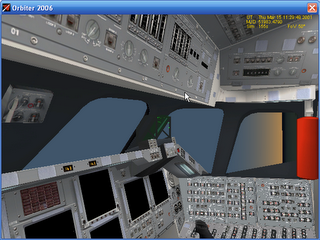

From Music of the Spheres comes news about the first patch for Orbiter 2006, which as usual includes a bunch of under-the-hood improvements and a spiffy new 3-d cockpit for the Space Shuttles. If you haven't downloaded the newest version and taken Orbiter for a test flight, now would be a great time.
Friday, September 29, 2006
The Real Star Control III: Update
Second, the incomparable Pages of Now and Forever brings news from Toys for Bob, the current home of famous Star Control developers Fred Ford and Paul Reiche. Apparently, they have received approximately 3000 messages supporting a new sequel to Star Control II after their initial plea for support earlier this year, and they still want a new PC version of Star Control to be their next game.
There's still time sign the petition supporting a new Star Control here, show your support by emailing Toys for Bob at the address here, and of course play the best PC game ever made yourself by downloading the open-source Star Control II release The Ur-Quan Masters by from here.
Friday, September 22, 2006
The Great Linux Experiment
 I've been buried under a blizzard of paperwork and a dense overlapping tangle of immobile deadlines over the past few months. Haven't had much time for gaming, but you can't keep a Techno-Nerd Master down for long. Being an adventurous sort, I recently volunteered to be a Linux "Guinea Pig," meaning that I joined the Linux conversion pilot program at my place of business, and in the process evaluated several different versions of Linux. Why subject myself to the annoyance of switching operating systems, you ask? Well, for starters, I was mightily impressed with the Ubuntu partition I played around with earlier this year on my little Inspiron (That hard drive space has since been claimed by SWAT 4...more on that soon...). However, the big reason is that I've had a *lot* of problems with Windows XP: Boot sector problems, device driver conflicts, file association errors, slow restarts, firewall clogging, slow startups--you name a problem, and I've had it. Although I've always been a Microsoft user and in general like their products, I just have to say that Windows XP has been an awful computing experience. It's not like I'm manually editing the registry (although I've had to do that to correct problems...) or reconfiguring the hardware interrupts or overclocking or have a hard drive stuffed with viruses. WinRot is much more pervasive in XP, and it's just too darn easy for an average user doing average things to just destroy Windows XP to the point where you have to reformat and reinstall the operating system. Repeatedly. After the great annoyance of my last reformat a few months ago, I'm open to alternatives, at least for productivity tasks at work (you just can't replace Windows for gaming, so no home boxes yet). The capabilities of modern Linux environments are comparable to Windows systems, and the stability of Linux, especially when compared to a system beset with WinRot, is very appealing.
I've been buried under a blizzard of paperwork and a dense overlapping tangle of immobile deadlines over the past few months. Haven't had much time for gaming, but you can't keep a Techno-Nerd Master down for long. Being an adventurous sort, I recently volunteered to be a Linux "Guinea Pig," meaning that I joined the Linux conversion pilot program at my place of business, and in the process evaluated several different versions of Linux. Why subject myself to the annoyance of switching operating systems, you ask? Well, for starters, I was mightily impressed with the Ubuntu partition I played around with earlier this year on my little Inspiron (That hard drive space has since been claimed by SWAT 4...more on that soon...). However, the big reason is that I've had a *lot* of problems with Windows XP: Boot sector problems, device driver conflicts, file association errors, slow restarts, firewall clogging, slow startups--you name a problem, and I've had it. Although I've always been a Microsoft user and in general like their products, I just have to say that Windows XP has been an awful computing experience. It's not like I'm manually editing the registry (although I've had to do that to correct problems...) or reconfiguring the hardware interrupts or overclocking or have a hard drive stuffed with viruses. WinRot is much more pervasive in XP, and it's just too darn easy for an average user doing average things to just destroy Windows XP to the point where you have to reformat and reinstall the operating system. Repeatedly. After the great annoyance of my last reformat a few months ago, I'm open to alternatives, at least for productivity tasks at work (you just can't replace Windows for gaming, so no home boxes yet). The capabilities of modern Linux environments are comparable to Windows systems, and the stability of Linux, especially when compared to a system beset with WinRot, is very appealing.As part of the process, I was able to try several Linux distributions. I first tried the universally liked OpenSUSE 10.1. I sure was impressed by the nifty graphical installer, but it didn't actually work with my work computer, a vanilla Dell PC, circa 2002. For whatever reason the desktop environment wouldn't display on my monitor, and since answers weren't forthcoming quickly from the forums, I decided to stop twiddling with OpenSUSE and try something else.
I then set up Fedora Core 5, which was a vast improvement. I was tremendously impressed with the robust Fedora Core 5 distribution, and I would easily recommend it to someone seeking to try a version of Linux. Unfortunately, I couldn't get some software packages that I need to work with FC5, despite much twiddling.
At this point, setting up a Linux partition was beginning to seem like a whole lot more trouble than it was worth. I had been favorably impressed with Ubuntu Linux earlier this year, so I decided to give it another try for my work partition. Plus, Ubuntu recently released it's new 6.06 version, so I was eager to see what had been improved. The new Ubuntu 6.06 graphical setup screen was actually in my view a significant step backwards in terms of ease-of-use and capability from the Ubuntu 5.1 text-based setup, and wasn't nearly as easy to use as the OpenSUSE or FC5 setups. That's one of the significant Ubuntu 6.06 drawbacks, especially for a Linux newbie such as myself. On the other hand, once I had set up my partition space (thanks in no small part to the experience I gained setting up OpenSUSE and FC5; I doubt I would have been successful otherwise), the actual configuration of my desktop and the installation of the software packages that I need took about 20 minutes, and I was up and being productive shortly thereafter! A far cry from the time consuming hardware and software difficulties that I had encountered with OpenSUSE and FC5, which propelled Ubuntu 6.06 to victory in this particular contest. The precompiled Debian packages that you can access through the Ubuntu repositories are truly great, especially if you don't have the time to mess around with installing software. You can get more Ubuntu packages more conveniently and more quickly through the Ubuntu repositories than you can with either OpenSUSE and FC5. This ease-of-use is probably Ubuntu's greatest strength.
 I then had to decide between the KDE (Kubuntu, pictured at left) and the GNOME (Ubuntu) desktops. Each one has its strong points; however, despite the fact that I appreciated the greater control and more options offered by the KDE desktop, I find that it is easier to get work done in the GNOME environment. I'll give KDE another shot in the future, but for right now I'm using a highly customized GNOME environment and liking it immensely. As I pointed out in my original Ubuntu review, I feel that the GNOME environment has significant advantages over the standard Windows environment.
I then had to decide between the KDE (Kubuntu, pictured at left) and the GNOME (Ubuntu) desktops. Each one has its strong points; however, despite the fact that I appreciated the greater control and more options offered by the KDE desktop, I find that it is easier to get work done in the GNOME environment. I'll give KDE another shot in the future, but for right now I'm using a highly customized GNOME environment and liking it immensely. As I pointed out in my original Ubuntu review, I feel that the GNOME environment has significant advantages over the standard Windows environment. I've been running the Ubuntu partition for almost two months now, and in general the experiment has been a success. Once you get it working, Ubuntu 6.06 is amazingly stable and the GNOME environment is really pleasant to use. I can create, open, and send PDF files; OpenOffice lets me open and edit MSOffice files easily without any problems so far; GIMP works fine for image processing tasks, and some of the more important customized software packages that I need have worked fine in Linux so far. Firefox has also proven its worth once again; its platform-neutrality coupled with the power of Google Browser Sync and Google Notebook (more on those later, too...) has significantly reduced the browser twiddle quotient. Ditto for Thunderbird, which remains my favorite e-mail client. Ubuntu 6.06 sports Thunderbird 1.5, a vast improvement over the Thunderbird 1.06 testing build that was available for the last Ubuntu version.
Having gone onto the record about how much I like it, I'll now go ahead and highlight a few of my bigger Ubuntu/Linux pet peeves from the perspective of a lifelong Windows user after a few months of constant use (no, that's not cliche at all...):
1) Hardware Support, Pt. I: It turned out to be relatively easy to set up Ubuntu to listen to most of the common audio and video formats, so that wasn't a problem. However, for whatever reason, the sound card drivers for my card don't work very well in Linux, although they work just fine for Windows XP. Whenever I try to listen to anything involving audio, the audio quality is terrible-it sounds like I'm listening through a waterfall with a front-end loader running in the background. Some more work there is definitely needed. I know it's sound-card specific to my machine because the Ubuntu partition on my laptop never had any problems at all with audio or video playback.
2) Evolution seems like a fine little e-mail client, but it's darn hard to configure properly. It also has a lot of trouble, for whatever reason, with our in-house email network (odd, because our email server is Linux-based). Kontact in KDE doesn't seem to have these problems, either. Fortunately, it's relatively easy to set up Thunderbird in Ubuntu, and I can use Firefox to access my Google Calendar, so I don't really need Evolution's functionality at the moment.
3) For any program not already in the Ubuntu repositories, installing it and setting it up is generally a real hassle. This was true with the other distributions that I tried. This is also where the only Linux system crashes that I've had thus far have occurred. Clearly, a better way of setting up new software is needed, especially to pull in the newbie contingent. The kinds of problems that I had would send a less-experienced user fleeing to the hills.
4) Both FC5 and OpenSUSE have fancy GRUB partition-selection frontends that easily handle the Windows XP partition if it exists, but Ubuntu 6.06 still has the text UI for the GRUB frontend, which is far less user friendly. The Ubuntu folks really, really need to fix this.
The hardware problems are the most aggravating of this particular set of problems, and will probably require the manufacturers to get more firmly onto the Linux bandwagon. The audio problem is annoying, for sure, but the lack of support for my Radeon card (the 7500 isn't that old, after all) is a serious issue.
Because there's some software packages that I require for work that aren't yet available for Linux, it's not a wholesale switchover and I'm going to maintain a Windows XP partition on my workstation that I switch back to on a regular basis. However, I've been genuinely surprised by how infrequently I've had to switch back to Windows. I generally only need to switch back about once a day, although I've gone for an entire week without having to switch back. I only switch over to Windows when it would be more efficient to work in Windows (meaning that the software I need doesn't work in Linux or equivalents aren't available). The fact that I can do so much using nothing but Linux applications is certainly impressive.
Wednesday, September 13, 2006
I Wish That More Game Companies Would Do Compilations

From Gamespot via the Civ Fanatics Forum comes the welcome news that 2K is releasing Windows XP versions of all four of the Microprose/Infocom/Atari/2K Civilization games (excluding the Activision Call to Power titles and the Civ IV:Warlords expansion) in a package along with a host of goodies, like DVDs and a Civilization card game. This is the prototypical Good Thing (although, I'm forced to point out, that both Sid Meier's Colonization and Sid Meier's Alpha Centauri should by rights be in this compilation pack too...but I'll stop looking the gift horse in the mouth now). In a similar vein, EA recently released an XP/Vista compatible Command and Conquer compilation. I love when game companies do this, and I wish more game companies would release modern updates of their classic games. It shows they have a sense of and respect for history and that they're not afraid that the older games will be better than their big-budget but often inferior sequels. Off the top of my head, here's a quick list of other classic game series that really should be ported to Windows XP/Vista and released in compilations:
Wing Commander: Yeah, this one is obvious. Wing Commander can make a pretty good case for being the Best PC Game Ever, and the first four games are outright masterpieces in their own right. There was a Windows 95 port of Wing Commanders I, II, and III called The Kilrathi Saga, but it didn't sell well, and copies on eBay are prohibitively expensive. Origin kludged together a Win95 version of Wing IV, but I it didn't work very well. EA shortsightedly canceled further Wing Commander games, and the movie was a complete turkey, so this one might be a tough sell. But, there are lots of us with very, very fond memories of the Wing Commander of Ye Olde Tymes. If EA printed a Windows XP/Vista port of the six good Wing Commander games and their expansion packs, I guarantee you that it would sell really well--there's a lot of pent up demand out there for a sequel. The Wing Commander games are all masterpieces (well, maybe not the last one, but it's still pretty good). I can't imagine that it would take too many people to update the codebase, so the profit margin on this should be respectable.
Harpoon I and II: Well, with the on-again, off-again Harpoon 4 in a state of limbo, this would be the next best thing to a modern sequel. The first game is still one of the finest strategy games every produced and remains fun to play, if you're willing to fight with DosBOX. The expansion packs for the first game were hard to pick up at the time; there was something called the "Commander's Pack" which had the first two expansions but the last two were fairly hard to find. I never found the fourth one in a retail store near where I lived. Just a XP/Vista port of first game with all of the expansion packs would make a great compilation.
The Microprose Military Sims: This one is another no-brainer. Beginning with Sid Meier's classic F-15 Strike Eagle, Microprose produced a long and so far unequalled string of incredibly good military simulations, each one a classic: F-15 Strike Eagle, Silent Service, F-19 Stealth Fighter, M-1 Tank Platoon, Red Storm Rising, F-15 Strike Eagle II, Silent Service II, Knights of the Sky, F-117 Stealth Fighter 2.0, 1942: Pacific Air War, B-17 Flying Fortress, Gunship 2000, F-15 Strike Eagle III, F-14 Fleet Defender, and M-1 Tank Platoon II [I'm not including Falcon 4.0 on the list because an update apparently is, in fact, on the way.] Microprose is no more, but if I recall correctly Firaxis actively acquired the rights to most of these titles last year, so at least some hope exists. These games are truly great examples of fun, playable, yet accurate combat simulations, a type of game which is sorely missed at the moment (Jane's USAF was the last good example of a game of this type, and that needs a Windows XP update, too, now that I'm thinking of it...).
The Dune Games: This one is another no-brainer. Dune and Dune II were groundbreaking games; Dune 2000 and Emperor were also both pretty fun. A compilation would make another great XP/Vista port, especially with the recent resurgence of Dune popularity (two new miniseries, new books). Dune 2000 runs very well on XP, but none of the rest of them do. An XP/Vista port of the original Dune, especially, would be a great thing.
SimCities: Again, this one has been done, but I imagine we might see something like this in the run-up to Spore. An XP/Vista friendly compilation of all of the SimCity games, plus their expansion packs, would be both handy and fun.
Star Fleet: I'm not sure who owns the rights to these games, but Star Fleet I, Star Fleet II, and the space ground-war sequel Star Legions were all great strategy games in the 1980s from Interstel. Probably will never happen, but I'll put them on this list anyway.
LucasArts Sims and Adventures: Between the Larry Holland series of flight simulators (e.g., Battlehawks and Secret Weapons of the Luftwaffe) and the classic LucasArts SCUMM adventures (Indiana Jones and the Fate of Atlantis, the timeless masterpiece of The Dig) LucasArts has released some great games over the years. It would be great to see a big Windows XP/Vista-friendly reissue of the LucasArts Archives compilation of some of the more notable ones, like X-Wing, SWoTL, and Fate of Atlantis.
There's a few others that would rightfully be on this list, but enterprising fans have taken the initiative: Tierra Games has been updating the classic Sierra Adventures and letting folks download them for free (good for them!) and Toys for Bob has let the fan community port the timeless Star Control II to Windows XP as The Ur-Quan Masters. Here's hoping that the EA C & C compilation and the Firaxis Civilization Chronicles sell well enough to begat more releases of this sort.
Be sure to also check out Juliraptor's quick review of Civilization IV here; BNGPossum's comprehensive three-part review of Civilization IV ( here, here, and here); our report of a 3-day Civ IV multiplayer match; Juliraptor's discussion of how to mod Civ IV; and BNGPossum's discussion of other games he'd like to see remade.
Image credit: Firaxis via Gamespot.
Sunday, August 06, 2006
A Timely Review of Galactic Civilizations II
As I've discussed previously, I'm a big fan the space strategy 4X genre. So, I had purchased the first GalCiv game with high hopes, especially since it got some really glowing reviews. Although it had some good ideas (like the dual military/social production queues, something which really, really, really needs to find its way into Civ IV) and the AI was quite good, for a variety of reasons (too many to go into detail here) I really didn't think the game was that fun. Ultimately, Master of Orion II found its way back onto my hard drive, and I was kind of leery of GalCiv II.
So, I'll just get this out of the way right off the bat: I played both games extensively, and GalCiv II is a dramatic improvement from the first game. It's a fun, highly balanced and replayable strategy game.
The galaxy that you play in is completely customizable; you can have the star systems clustered into arms like a spiral galaxy or more evenly distributed (MOO-style) in a globular cluster type formation, and you have a lot of control over the attributes of your civilization and the strength of your opponents. I liked being able to set how your opponents felt about you. I'll note at this point that I've only played it in sandbox mode and haven't tried the story-drive campaign mode yet.
However, the biggest single improvement is the fully scalable 3-D window showing the disposition of colonies, ships, fleets, and starbases in your galaxy. Amazingly, it's completely functional while zoomed all the way out--there are well-thought out symbols that instantly indicate what you're looking at (it looks a lot like the tactical display in Harpoon, actually). But when you zoom in, you see beautifully textured planets, plus wonderfully rendered starships and starbases with nebulae and stars in a nicely layered background. You can actually see continents on Earth, for example, and there's even a little Moon that's in orbit around the Earth, passing into and out of the shadow. The transitions between the "Harpoon view" and the "eye candy view" are spotless. It's gorgeous, and although it's 3-d, it works really well even on my little Inspiron. In fact, the hardware requirements for GalCiv II are completely reasonable; the game runs very well on my little Inspiron, although it has had some trouble in late-game situations in Huge galaxies with abundant habitable worlds [Quick side note: The completely reasonable hardware requirements of GalCiv II, which like Civ IV is an epic turn-based strategy game running a 3-d engine, shows pretty definitively how absolutely ludicrous Civ IV's hardware requirements are....].
Which brings us to the starship designer, which is almost a game unto itself. You can spend hours twiddling with all of the various configurations available to you. This part is actually very similar to Simon & Schuster's Star Trek Starship Creator: You pick a hull, then you select the components to kit it out and attach them to hardpoints on the hull. The Collector's Edition includes a lot of new components for the ships, and endless configurations are possible. I managed to make a reasonably decent approximations of both an Imperial Star Destroyer and the USS Enterprise, which was neat. Definitely a highlight of the game. You can watch the battles that unfold in 3-d mode, but unfortunately the rumored 3-d tactical combat mode was removed from the game in preproduction. I gather it might appear in GalCiv III.
The planetary management view has been significantly improved as well: Unlike other 4X games like GalCiv, MoO II, Birth of the Federation, or Star Wars Rebellion, where you're essentially building Civ-style cities in space, the planets in GalCiv II feel, like, well, planets. You see a nice randomly generated texture map of the planet (which matches what you see in the big 3-d view) and you select where you want to put individual improvements. Certain tiles have special bonuses, such as Precursor ruins (A nice nod to Star Control! In fact, like GalCiv, this game is full of tongue-in-cheek references to other works of science-fiction) relics or fertile farmland. The dual production queues are thankfully still present.
Managing your civilization is also very well done: You can instantly determine the status of your colonies using the spiffy "Colony Management" screen (which would be an excellent template for replacing the useless city advisor mode in Civ IV, hint, hint...). You can also issue blanket orders for unit production using the "colony governor" screen, which is handy.
Diplomacy features a Civ III- style diplomatic table with a complete range of bartering options; not to sound like a broken record, but this is the diplomatic interface that Civ IV should have had. The AIs are smart, and present a challenge even on the lower difficulty levels.
I'll also give Stardock a special kudos for their excellent support of the game; they issue frequent patches. Plus, the game isn't protected by any sort of dubious, StarForce protection scheme that inhibits CD player functionality or causes the computer to crash, and registering with the serial number is optional (although it's worth it, because you get access to some nifty goodies). It's a refreshing change that I hope other developers emulate.
There are still some problems with the game, although for the most part they don't interfere with the fun to a large extent. First, although there's a colony governor screen, it's just used to issue blanket commands to all of your colonies. GalCiv had a MoO-II style system of installing leaders of colonies to manage production which is completely absent (or just buried enough that I couldn't find it) from GalCiv II. As is typical for 4X games, without some system of autonomously running a most of the colonies the late game can get kind of twiddle-intensive.
Second, managing colony and constructor ships is still twiddle intensive; the hotlink that supposed to show you the list of your colony and constructor ships doesn't do much, so it's hard to see where your colony and constructor ships are, not to mention where they're going.
Third, I was personally quite annoyed that they divided the functions of the starbases into four separate classes (military, influence, mining and economic) starbases, each of which has their own improvement tree requiring the use of constructor ships. This is the only case of a regression from GalCiv: Starbases just aren't fun anymore. I can see why the designers did this (in GalCiv, the planets were virtually secondary to the powerful starbases), and I don't necessarily disagree with their reasoning. But, after trying it, having four separate kinds of Starbase doesn't actually improve the game. It only adds more twiddling. My solution: I only built the mining and influence starbases.
Fourth, there's no way to upgrade classes of starship directly from the upgrade screen (at least, I couldn't find it). Instead, you have to find an individual from the class of ship to be upgraded, double click on it, hit upgrade, then check off "upgrade all ships in class" and hope you have enough money to cover the bill. Don't get me wrong, I'm glad that there's an upgrade function, but wouldn't it have made more sense to just let you do a blanket upgrade from the shipyard?
Fifth, there's currently no multiplayer mode. I gather that originally this had been scheduled to be added in a patch, and then was dropped entirely. Here's hoping it shows up in GalCiv III.
Finally, and most importantly, the technology tree is an absolute mess. You hear frequently (and incorrectly) that SMAC had an incomprehensible tech tree. That's absolutely untrue, but I suspect that even the most die hard hater-of-SMAC would freely admit that GalCiv II's tech tree (despite the big poster that comes with the Collector's edition of the game) really is incomprehensible. The names (like Laser 3 and Shields II) really don't tell you much about the technology you're researching, and the entries describing the techs do a perfectly awful job of both describing the technology and illustrating what you'll get out of the research. There's no Civ IV-style "Galactopedia" (there is a user mod that adds something like a Galactopedia, but you have to Alt-Tab out and the game isn't fond of Alt-Tabbing). They really need to simplify the tech tree, too: The one time thus far I researched the ultimate technology victory, I was only halfway through the tech tree for the weapons and the shields! This is one area where GalCiv II really could use some improvement, quickly. Fortunately, a Galactopedia functionality is on the list of things that will be included in the expansion pack.
However, when you consider the total package of GalCiv II, this is easily the best space conquest game since Master of Orion II. In many respects, it's better than last year's Civilization IV, and it's my favorite strategy game of this year thus far. I heartily encourage both fans of 4X games and strategy gamers in general to run out and grab a copy, if they haven't already. You won't regret it.
Sunday, July 02, 2006
Your government, working for you
Wednesday, June 28, 2006
The Best Space Exploration PC Games
We have a big solar system, and as near as we can tell, we have it all to ourselves. So, there's lots of room for adventures both big and small, and you don't need warp drives, stargates, or lightsabers. As you might expect, I'm a big fan of what Clark Lindsey over at HobbySpace (which is the best space site on the Internet, IMHO) calls "Solar Sci-Fi": science fiction set in the context of near term solar system exploration and settlement. Unfortunately, there really haven't been that many games about real-world space exploration and development. Nevertheless, there have been some great space exploration titles released over the past two decades. Let's rocket down memory lane to see my favorites. I'll confine this list to PC games, not just nifty computer toys like the Virtual International Space Station. That's a topic for a another post. There's also a comprehensive list of space-related software over at HobbySpace, which is definitely worth looking at if you're interested in finding other software packages of this nature. Plus, there's a chance that I missed a good one-if I did, let me know!
Project Space Station: (abandonware; available from the Home of the Underdogs)
Modern updates: Shorthike (shareware, limited demo available)
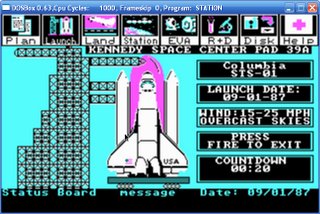 This was the computer game that I wanted to play back in 1984 (well, besides Star Raiders). It was available for both the Apple II and the IBM-PC AT (I played it at a friend's house) platform. Of course, I didn't replace my trusty Atari 800 with a PC AT until 1990, so I missed out. Thanks to the Home of the Underdogs and DOSBox, however, I've had a chance to try this title again.
This was the computer game that I wanted to play back in 1984 (well, besides Star Raiders). It was available for both the Apple II and the IBM-PC AT (I played it at a friend's house) platform. Of course, I didn't replace my trusty Atari 800 with a PC AT until 1990, so I missed out. Thanks to the Home of the Underdogs and DOSBox, however, I've had a chance to try this title again.
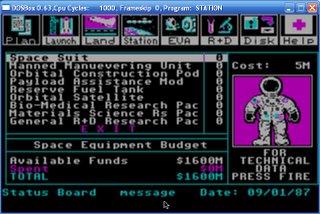 Project: Space Station is still hailed as one of the best space exploration games ever produced. It succeeds because it distills what is a very complex enterprise - the design, construction, and operation of a space station in low earth orbit - down to the fun essentials. It was designed by Larry Holland (of SWoTL, X-Wing, and Bridge Commander fame) and displays the same characteristic attention to detail displayed in those later titles. Holland received a lot of help and support from NASA, and it shows.
Project: Space Station is still hailed as one of the best space exploration games ever produced. It succeeds because it distills what is a very complex enterprise - the design, construction, and operation of a space station in low earth orbit - down to the fun essentials. It was designed by Larry Holland (of SWoTL, X-Wing, and Bridge Commander fame) and displays the same characteristic attention to detail displayed in those later titles. Holland received a lot of help and support from NASA, and it shows.
The player is the executive in charge of managing the construction of NASA's first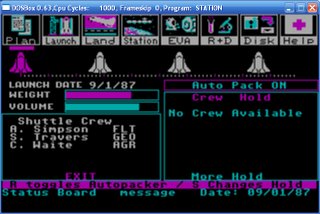 permanent space station in low earth orbit. The player must hire astronauts, select a space station design, purchase station components, manage a budget, and select which experiments to perform. You have simplified options that accurately reflect real-world choices. Never has managing a large multibillion dollar project been so fun! The goal, of course, is to eventually build up a large orbital outpost that pays for itself with useful research, on-orbit capabilities, and profitable discoveries.
permanent space station in low earth orbit. The player must hire astronauts, select a space station design, purchase station components, manage a budget, and select which experiments to perform. You have simplified options that accurately reflect real-world choices. Never has managing a large multibillion dollar project been so fun! The goal, of course, is to eventually build up a large orbital outpost that pays for itself with useful research, on-orbit capabilities, and profitable discoveries.
In addition to managing the project, the player is also placed in control of the STS missions to the station. You have to guide your Orbiter to the proper orbit, correctly assemble the station components, guide the offloading of supplies, and then return the 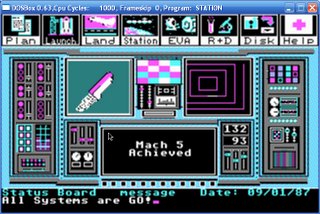 orbiter safely to earth. It sounds complicated, but it's actually a lot of fun. This really isn't a flightsim (not that flight sims aren't fun!), but more of a simplified representation of things that in real life are pretty hard to do successfully. The closest analog that I can think of to these parts of the game is actually Star Control's marvelously fun overhead space combat and movement interface. When you put it together, you have a fun-filled but downright educational game that is a blast to play. This is the way that the last twenty years in space should have happened. It is a real shame that the ISS is just a pale shadow of these ambitious 1980s plans for the Free World's first permanent space outpost. If things had worked out just a little differently, it really would have been like Project: Space Station.
orbiter safely to earth. It sounds complicated, but it's actually a lot of fun. This really isn't a flightsim (not that flight sims aren't fun!), but more of a simplified representation of things that in real life are pretty hard to do successfully. The closest analog that I can think of to these parts of the game is actually Star Control's marvelously fun overhead space combat and movement interface. When you put it together, you have a fun-filled but downright educational game that is a blast to play. This is the way that the last twenty years in space should have happened. It is a real shame that the ISS is just a pale shadow of these ambitious 1980s plans for the Free World's first permanent space outpost. If things had worked out just a little differently, it really would have been like Project: Space Station.
You can get the game working easily using the excellent Dfend/DOSBox combo, so I would 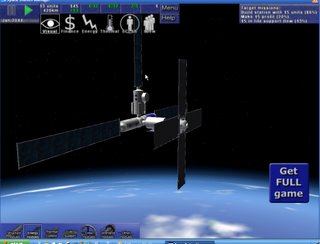 heartily encourage everyone to download and try this gem.
heartily encourage everyone to download and try this gem.
Nobody has ever tried to do a modern version of this game, although ShortHike (formerly Space Station Manager) is a good, SimCity style shareware space station construction program where you get to design, construct, and manage an orbital outpost with really snazzy 3-d graphics. You can download the demo for ShortHike here.
Shuttle: (Abandonware; Available from the Home of the Underdogs)
Modern Update: S3
I'm actually quite surprised that none of the big simulation firms (Dynamix, Jane's, Microsoft, etc.) ever tried to do a Space Shuttle simulator, because the Shuttle is a great topic for a computer game. One probably would have happened eventually if the Flightsim bubble hadn't burst (Dynamix, MicroProse, and Jane's are no more, and Microsoft seems to be abandoning the PC as a gaming platform) in the late nineties. Shuttle: The Space Flight Simulator, a 1992 offering from Virgin Games, is to my knowledge the last full, commercially available PC game about the Space Shuttle. It did an amazing job of distilling the most complex machine ever constructed to 3 1.2 MB floppy disks. It was a little skimpy on the tutorials, but it did offer a mode that guided you to the proper switches on the command deck, handy for those of us with out four years of astronaut training. It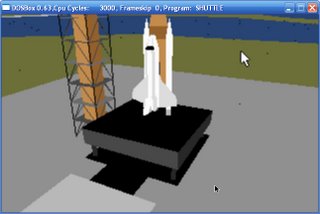 also offered a somewhat-confusing-but-OK- when-you-got-used-to-it "Time Skip" feature that let you skip to the next mission event, so you weren't expected to do the mission in real time. In principle, you could even do an automated skip to the end of the mission, but the landings (which, when you're flying the world's heaviest glider hypersonically at a trajectory seven times steeper than a commercial jetliner's, are quite challenging) had to be done manually.
also offered a somewhat-confusing-but-OK- when-you-got-used-to-it "Time Skip" feature that let you skip to the next mission event, so you weren't expected to do the mission in real time. In principle, you could even do an automated skip to the end of the mission, but the landings (which, when you're flying the world's heaviest glider hypersonically at a trajectory seven times steeper than a commercial jetliner's, are quite challenging) had to be done manually.
Of course, the nuts and bolts of any simulation game are the missions. You followed a linear mission track, starting with a 1977 Approach and Landing Test, then proceeding to the orbital flight tests, then satellite deployment, EVAs, Hubble deployment, satellite 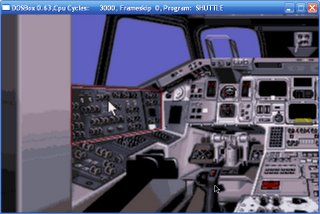 rescue, MMU testing, spy sat missions, and Space Station construction. Each mission was interesting, but the on-orbit space operations (doing EVAs and using the Canadarm) were fascinating.
rescue, MMU testing, spy sat missions, and Space Station construction. Each mission was interesting, but the on-orbit space operations (doing EVAs and using the Canadarm) were fascinating.
I'd love to say that I completed every mission, but I didn't. I got up to the Hubble deployment mission, but when I got into orbit and tried to deploy the Hubble, I encountered a nasty bug: Mission Control told me that it was going to take approximately 3,000 years for my cargo bay doors to open. D'oh! I never got to the nifty Station construction missions at the end. This bug was 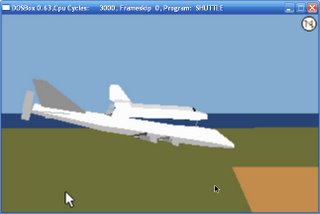 fixed by a patch that I was never able to obtain (and haven't been able to find since) because Virgin Games went out of business. This game runs reasonably well using DosBOX and it's available from the Home of the Underdogs if you want to give it a try, but there are some better options available currently.
fixed by a patch that I was never able to obtain (and haven't been able to find since) because Virgin Games went out of business. This game runs reasonably well using DosBOX and it's available from the Home of the Underdogs if you want to give it a try, but there are some better options available currently.
I've never tried it (I'm a Microsoft Flight Simulator guy, myself) but the X-Plane flightsim has a mode where you can perform a Shuttle reentry and landing, thanks to its spiffy computational fluid dynamics coding (SpaceShipOne's pilots and designers used a version of 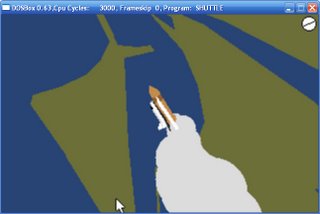 X-Plane for training and testing, it's CFD codes are that good).
X-Plane for training and testing, it's CFD codes are that good).
The best bets are probably the extensive Shuttle Mods for Orbiter Space Flight Simulator; Eugene Harm also has a great guide to getting the Shuttle working in Orbiter here. Orbiter's large and active fan community is constantly upgrading and improving these mod packages. They're already pretty good, and I fully expect someone to use Orbiter to complete a top-to-bottom Shuttle simulation experience within a few years.
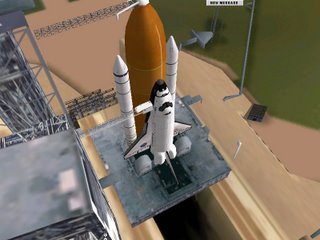 Finally, there's the Space Shuttle Simulator (screencap at left), an ambitious attempt to update the Virgin Games offering discussed above with modern graphics and interface. A beta version is available, and although the designer admits it's only 10% complete it already looks really promising. It's definitely worth the download.
Finally, there's the Space Shuttle Simulator (screencap at left), an ambitious attempt to update the Virgin Games offering discussed above with modern graphics and interface. A beta version is available, and although the designer admits it's only 10% complete it already looks really promising. It's definitely worth the download.
Buzz Aldrin's Race into Space (Abandonware)
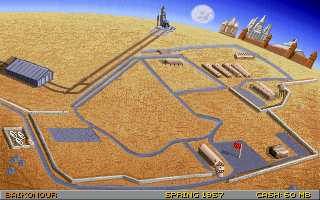 Well, as regular readers of this blog undoubtedly have figured out by now, I'm a big, huge fan of BARIS, which is still the most unique and creative strategy games ever done. I won't rehash what I said previously, but I will point you to Leon's "Buzz Aldrin's Race Into Space" Page, which is the best BARIS resource on the Net and includes the patch for the DOS version as well as a detailed guide to getting the game working in DOSBox using Dfend as well as disk images of the superior CD-ROM version of the game. I've gotten the DOS version working well in DOSBox, but I haven't been able to get my old CD-ROM version to work yet. Nevertheless, I really, really, really encourage everyone to try this game at least once.
Well, as regular readers of this blog undoubtedly have figured out by now, I'm a big, huge fan of BARIS, which is still the most unique and creative strategy games ever done. I won't rehash what I said previously, but I will point you to Leon's "Buzz Aldrin's Race Into Space" Page, which is the best BARIS resource on the Net and includes the patch for the DOS version as well as a detailed guide to getting the game working in DOSBox using Dfend as well as disk images of the superior CD-ROM version of the game. I've gotten the DOS version working well in DOSBox, but I haven't been able to get my old CD-ROM version to work yet. Nevertheless, I really, really, really encourage everyone to try this game at least once.
Microsoft Space Simulator (Abandonware; Available at the Home of the Underdogs, but good luck getting it to work)
Microsoft Space Simulator was a very special game that was produced by the same folks behind Microsoft Flight Simulator. MSSS realistically simulated a space flight experience. It was a true simulator in the sense that it basically lacked a plot or narrative structure (although there were missions you could accomplish), instead letting the user completely define the experience. That's OK, because the scope of this game was infinite. You could do literally anything that you could imagine: launch a Space Shuttle to Space Station Freedom, land the lunar module Challenger at the Apollo 17 landing site in the Taurus-Littrow valley, land at a Martian base, take a space freighter to Pluto, take an interstellar ship to a nearby star system, or take a Bussard ramscoop to the edge of the galaxy.
There were also prepackaged missions that you could use to get started, such as doing an Apollo CSM-Lunar Module rendezvous in Lunar Orbit. You had a wide variety of realistic space vehicles at your disposal, which were all things that could be built using real-world engineering principles. Although everything was simulated using Newtonian physics, you didn't have to worry about celestial mechanics if you didn't want to, because there was a fully functional autopilot that could take you wherever you wanted to go. That feature alone, in my opinion, is a significant advantage that this 1994 title has over its spiritual successor, the Orbiter Space Flight Simulator.
The folks who bought this game loved it, but the sales still fell short of Microsoft's expectations. It was so far afield of a conventional flightsim (airplanes and spacecraft are actually quite different from one another) that the flightsim crowd never warmed to it, and folks who like their adventures spoon-fed to them Star Wars-style couldn't handle the fact that there wasn't a Privateer-style plot. That was apparently enough to convince Microsoft to abandon an updated Windows 95 version of the game that I heard was nearly completed by the time of cancellation, which is truly unfortunate. This game deserved better.
You've probably noticed that I haven't posted any of the spectacular vistas that you could see in this game (fortunately, there are lots of screen caps over at Microsoft Space Simulator Central; head over there for a look). That's because the DOS version, which is available from the Home of the Underdogs, is notoriously finicky with Windows. In fact, this is the last DOS program ever released by Microsoft, and it seems downright determined to not work with modern Windows systems. I could get it running well with Windows 98, but since that point I haven't had any luck getting it to work. I got it working with Windows 2000 once, but I forgot to write those steps down (D'oh!) and have never gotten it to work again (despite an awful lot of trying) in XP. I couldn't even get it working with DOSBox (which says a lot about how finicky it is). There are some posts in the DOSBox forums describing how some of those folks were able to get it working with DOSBox (although none of those suggestions worked in my case). There are also some detailed setup suggestions at the “Microsoft Space Simulator: A View from a Fan” page and some other neat stuff (including screen caps) at Microsoft Space Simulator Central. Definitely worth a download and a few minutes of configuration twiddling—the results are worth it if you can get it working.
Eagle Lander 3D (Shareware, available from http://eaglelander3d.com; Full version requires license)
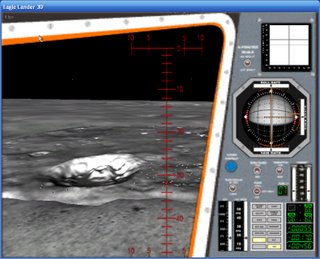 Well, July 20, 2006 isn't that far away. What better way to celebrate Apollo Day than by actually recreating humanity's first steps into the cosmic ocean yourself? You can do that, and more, with Ron Monsen's outstanding shareware flightsim Eagle Lander 3D. It displays a simply astonishing level of quality. The 3d-accelerated graphics are spectacular, including a fully-modeled virtual cockpit of the LM. The full version lets you do all kinds of cool things, including the landings at the Apollo 11 (Sea of Tranquility), 12 (Ocean of Storms), 15 (Hadley-Apennine), 17 (Taurus-Littrow) sites, as well as an LM racing course and a complete descent from lunar orbit.
Well, July 20, 2006 isn't that far away. What better way to celebrate Apollo Day than by actually recreating humanity's first steps into the cosmic ocean yourself? You can do that, and more, with Ron Monsen's outstanding shareware flightsim Eagle Lander 3D. It displays a simply astonishing level of quality. The 3d-accelerated graphics are spectacular, including a fully-modeled virtual cockpit of the LM. The full version lets you do all kinds of cool things, including the landings at the Apollo 11 (Sea of Tranquility), 12 (Ocean of Storms), 15 (Hadley-Apennine), 17 (Taurus-Littrow) sites, as well as an LM racing course and a complete descent from lunar orbit.
The evaluation version can be downloaded for free and includes a complete top-to-bottom simulation of the last sixty seconds of the powered descent of the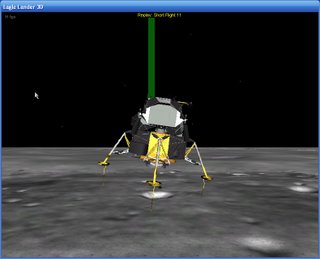 Apollo 11 mission. The final sixty seconds of the Apollo 11 descent were quite hairy, because the on-board flight computer was steering Eagle toward a field of large rocks scattered within and around a large crater. Neil Armstrong assumed manual control of the Eagle, and with Buzz Aldrin's assistance (Aldrin was calling out data from the on-board displays and the radar), guided it to a landing with approximately 15 seconds of fuel left (actually, they landed on "Empty," and only a postflight analysis was able to determine how much fuel they had left).
Apollo 11 mission. The final sixty seconds of the Apollo 11 descent were quite hairy, because the on-board flight computer was steering Eagle toward a field of large rocks scattered within and around a large crater. Neil Armstrong assumed manual control of the Eagle, and with Buzz Aldrin's assistance (Aldrin was calling out data from the on-board displays and the radar), guided it to a landing with approximately 15 seconds of fuel left (actually, they landed on "Empty," and only a postflight analysis was able to determine how much fuel they had left).
I've studied both the hardware and the surface operations of the Apollo missions extensively. However, although I understood on an intellectual level just how 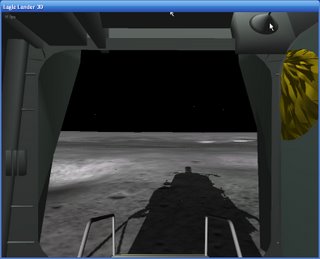 how much skill was required to land on the Moon, it wasn't until I tried this game that I fully understood just how difficult it was to guide a Lunar Module to a safe landing on Earth's “8th Continent” the first time around. As near as I can tell, the handling qualities of the Eagle are very accurately simulated, but once you get used to it, it's relatively straightforward to maneuver provided that you use a light touch on the stick.
how much skill was required to land on the Moon, it wasn't until I tried this game that I fully understood just how difficult it was to guide a Lunar Module to a safe landing on Earth's “8th Continent” the first time around. As near as I can tell, the handling qualities of the Eagle are very accurately simulated, but once you get used to it, it's relatively straightforward to maneuver provided that you use a light touch on the stick.
This game is full of nice touches. The aforementioned 3-d virtual cockpit is very well done and accurately but unobtrusively reproduces the interior of a Lunar Module. The coolest thing, though, is what happens when you safely land the 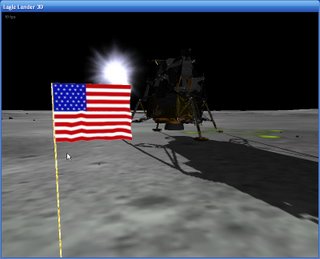 Eagle on the lunar surface: The game switches to a first person mode! You make your own journey down the ladder attached to the descent stage and explore Tranquility Base using FPS-style controls. It even simulates the "kanagaroo hops" that you experience in one-sixth gravity, so it's the closest most of us will get to the lunar surface until the first lunar hotels open up. Incredible. I really like Eagle Lander 3d, and I heartily recommend it. It's a lot of fun, and it also gives you an even bigger appreciation for the magnitude of the amazing accomplishment achieved on July 20th, 1969.
Eagle on the lunar surface: The game switches to a first person mode! You make your own journey down the ladder attached to the descent stage and explore Tranquility Base using FPS-style controls. It even simulates the "kanagaroo hops" that you experience in one-sixth gravity, so it's the closest most of us will get to the lunar surface until the first lunar hotels open up. Incredible. I really like Eagle Lander 3d, and I heartily recommend it. It's a lot of fun, and it also gives you an even bigger appreciation for the magnitude of the amazing accomplishment achieved on July 20th, 1969.
Orbiter Space Flight Simulator (Freeware; http://www.orbitersim.com)
 The Orbiter Space Flight Simulator, is a closed-source freeware space simulation platform, and the spiritual successor to Microsoft Space Simulator. This program has amazing graphics, is relatively easy to learn, and has a large and active user community that is constantly producing mods and extensions that increase the functionality of this program. Plus, you really can't argue with the price ($0). I still haven't spent much time with the new version, Orbiter 2006, but by all accounts it's a significant improvement over previous versions, including higher-resolution planetary textures.
The Orbiter Space Flight Simulator, is a closed-source freeware space simulation platform, and the spiritual successor to Microsoft Space Simulator. This program has amazing graphics, is relatively easy to learn, and has a large and active user community that is constantly producing mods and extensions that increase the functionality of this program. Plus, you really can't argue with the price ($0). I still haven't spent much time with the new version, Orbiter 2006, but by all accounts it's a significant improvement over previous versions, including higher-resolution planetary textures.
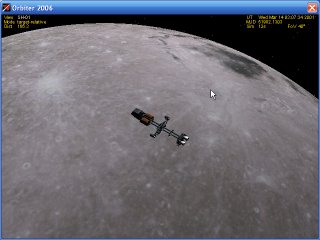 Orbiter is a significant achievement in flight simulation that I like a great deal, but like most freeware development efforts it still suffers from some minor problems [Disclaimer: these comments apply to the Orbiter 2005 version, not the new version released last month]. First and foremost, although Orbiter's greatest strength is its extensibility and customization features, the installation of mods can be a real chore that sometime requires extensive editing of text files. Minor text-editing errors can make the game crash, but tracking them down can be frustrating. I really hope that
Orbiter is a significant achievement in flight simulation that I like a great deal, but like most freeware development efforts it still suffers from some minor problems [Disclaimer: these comments apply to the Orbiter 2005 version, not the new version released last month]. First and foremost, although Orbiter's greatest strength is its extensibility and customization features, the installation of mods can be a real chore that sometime requires extensive editing of text files. Minor text-editing errors can make the game crash, but tracking them down can be frustrating. I really hope that 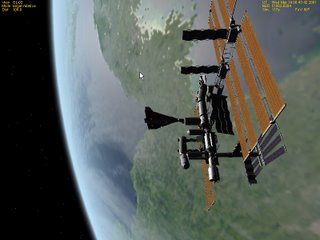 future versions of this game have a FS2004 mod-management interface. Secondly, there isn't really a Microsoft Space Simulator-style autopilot. An inspection of the Orbiter forums revealed that there are some sound physics-based reasons for not having an autopilot, but that makes it hard for beginners or users without a lot of time on their hands to get started with the game. Hopefully a fully featured autopilot will pop up in the future versions (perhaps just limited to a single vessel class). However, there are a lot of mods out there to automate things like space shuttle launches or a lunar module landings), which helps to mitigate this particular issue. At least one Orbiter autopilot project has also been started, and there are autopilot capabilities in the excellent Deltaglider III mod. Still, these minor quibbles aside, this is a great game and well worth the free download. I'm really looking forward to spending some quality time with the new version.
future versions of this game have a FS2004 mod-management interface. Secondly, there isn't really a Microsoft Space Simulator-style autopilot. An inspection of the Orbiter forums revealed that there are some sound physics-based reasons for not having an autopilot, but that makes it hard for beginners or users without a lot of time on their hands to get started with the game. Hopefully a fully featured autopilot will pop up in the future versions (perhaps just limited to a single vessel class). However, there are a lot of mods out there to automate things like space shuttle launches or a lunar module landings), which helps to mitigate this particular issue. At least one Orbiter autopilot project has also been started, and there are autopilot capabilities in the excellent Deltaglider III mod. Still, these minor quibbles aside, this is a great game and well worth the free download. I'm really looking forward to spending some quality time with the new version.
With the success of the Mars rovers, the resumption of Shuttle flights, the new Vision for Space Exploration, and most importantly, the onset of space tourism and commercial space development, space is ever-so-slowly starting to get appealing again. I therefore hope and expect that we'll see some more “solar sci-fi” PC games coming out in the next few years. Right now, the best space games available are Orbiter and Eagle Lander 3D. I doubt that we'll see a commercial equivalent for Orbiter, but I wouldn't be surprised if suborbital spaceflights appear in future versions of Microsoft Flight Simulator. There are some other games that I'd actually like to see more, though, including a modern remake of BARIS, perhaps with the planning of a Mars settlement effort instead of the space race-era lunar missions. I'd also really, really like to see a full-blown Civilization in Space game, where your job as the leader of a nation on Earth is to economically develop cislunar space as well as to establish independent colonies on the Moon, Mars, and asteroids--like Alien Legacy, but in our own solar system.

